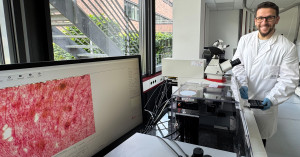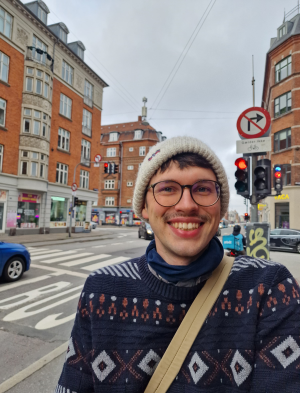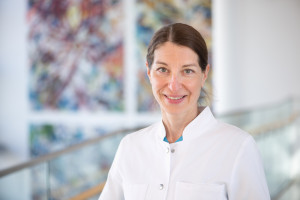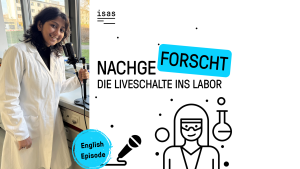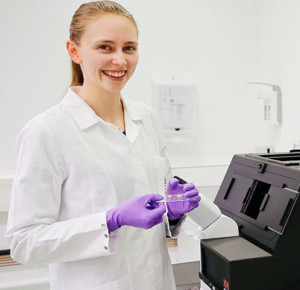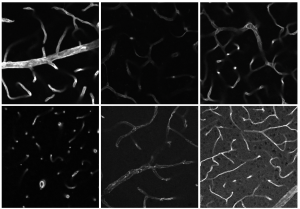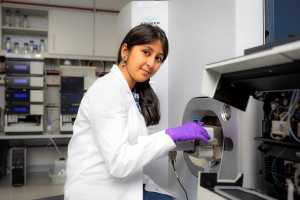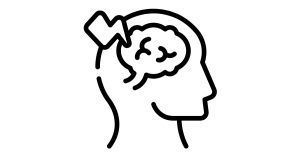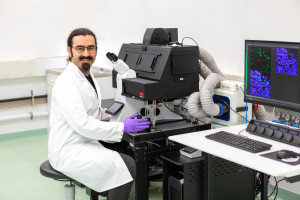Dortmund, 5th July 2022
In the middle of the pandemic, Susmita Ghosh decided to leave her home country for the first time in her life. For her dissertation, the 25-year-old moved from Kolkata to Dortmund, to ISAS. Since October 2021, the biologist has been actively involved with the doctoral students at the institute alongside her research project. In this interview, Ghosh reports on how she has settled in and what advice she has for other young researchers from abroad.
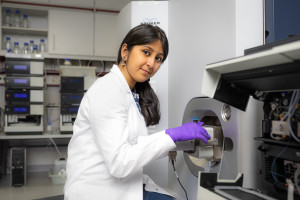
Susmita Ghosh uses the ultra-sensitive mass spectrometer to analyse her samples for her dissertation on »Unravelling the molecular makeup of neutrophils invading tumours and inflammatory tissues«. Outside the lab, the biologist writes short stories in her native language Bengali.
© ISAS / Hannes Woidich
How did you first notice ISAS?
Ghosh: I’ve always been fascinated by immunology but didn’t get many opportunities to work in this field in the past. Hence, I wanted to explore immunology more as a topic in my doctoral study. When I was looking for a PhD position in immunology, I found the job advertisement on the internet. I was fascinated by Prof Dr Matthias Gunzer’s research as well as the scientific output at ISAS.
Why did you choose to leave India and come to ISAS for your PhD?
Ghosh: It was indeed a tough call for me to leave my parents and friends. However, I always believe that in order to achieve something great, you’ll have to sacrifice something great. Today, I’m in Dortmund to achieve my goal. Here, I can undertake my doctoral studies and at the same time hone my knowledge and experience in immunology. All of this helps me get a step closer towards my goal of becoming an independent researcher. I can’t thank myself enough for having made the right decision.
What was your job interview like?
Ghosh: I believe interviews always make any candidate nervous. I was additionally excited because I had just recovered from COVID-19. The interview was 15 days after I had a severe infection with breathing trouble including having to use an inhaler, and other complications. But the moment I saw Matthias Gunzer and one of his PhD students, I instantly felt more comfortable. My first interview with them was more like a scientific discussion rather than an interview. During my second interview, I had the opportunity to talk to Prof Dr Albert Sickmann. That’s where I realised that I will get a ton to learn from the various scientific disciplines at ISAS.
What did it feel like to start a new chapter in your life during a pandemic?
Ghosh: It was very much a mix of emotions for me. Before I got here, a few other renowned research institutes rejected my application because of the pandemic itself. In the mid of all negative things happening around me, the positive response from ISAS really made me happy and boosted my confidence, for which I am grateful. At the same time, it wasn’t easy for me to leave my family during these difficult times.
How long did it take to settle in?
Ghosh: The first two months were very difficult; it took some time for me to settle in. In the second month of my stay here in Germany, I was diagnosed with back pain issues, but I managed those situations. I’m very thankful for my colleagues Fiorella, Ewelina, Amol and Laxmikanth, who helped me a lot whenever I needed their support. They made me feel like I have a new family here.
Congratulations on being elected as one of the two PhD student speakers. What do you and your co-speaker Flora Weber want to achieve, which topics would you like to address?
Ghosh: This is indeed a huge responsibility for us. The first thing we both felt is that we’d like to encourage the communication between the PhD students at the institute’s City and Campus locations. There hasn’t been much face-to- face contact lately. Of course, the pandemic is one of the major culprits for that. We’d like to engage our fellow PhD students more in social gatherings via various seminars, ISAS Summer School, workshops and excursions. We are currently preparing to bring in new ideas for our Summer School. Thanks to our former PhD representatives and their work, things are easier for us than we expected.
Before you came to ISAS – how much did you know about the institute’s PhD programme?
Ghosh: I made myself familiar with ISAS’ graduate programme before I made the decision to come. I’d like to thank my former PhD colleague Julia Lill who is currently in Boston. She helped me a lot with information about the institute’s work culture, its PhD programme and other necessities.
Was it easy to find an apartment in Dortmund? Did you have any help?
Ghosh: No, it was definitely not an easy job to find an apartment from India. At first, I booked an apartment via Airbnb for one month. My colleagues at ISAS were a huge help. It was through one of my fellow PhD students that I found the apartment where I’m currently living.
Do you have any tips for other PhD students coming from abroad?
Ghosh: I personally feel that most of the students I know have doubts whether they’ll get used to a new country and culture. Even I felt the same when I was on the other side, back in India. However, what I’ve realised is that if you’re passionate about your work, you should just follow your dream and go ahead and apply. The rest will eventually fall into place and you’ll adjust to your new surroundings over time.
Is there anything in particular that you enjoy at ISAS?
Ghosh: Here, I really do enjoy the friendly working environment and work life balance. Moreover, I love the conversations with other scientists regarding my own or their research project. Frankly, who wouldn’t be happy to have such friendly colleagues and a supervisor who encourages you to pursue new ideas?
(The interview was conducted by Sara Rebein)
